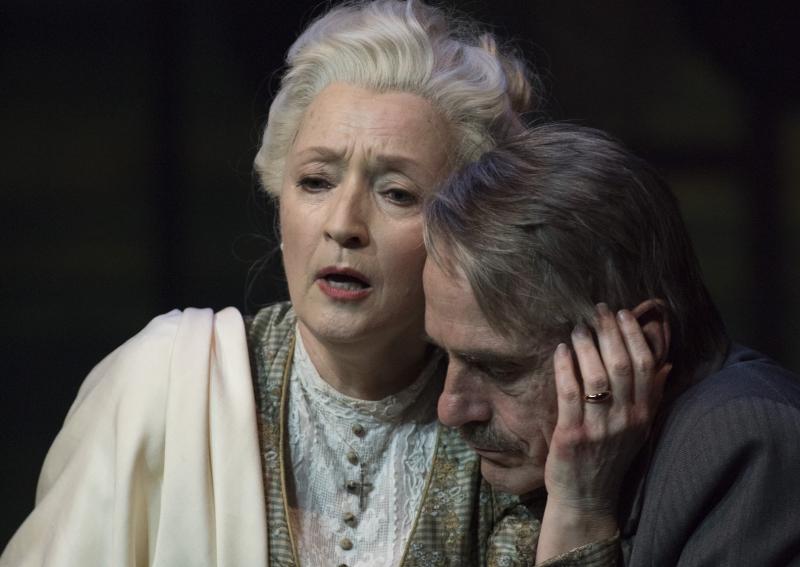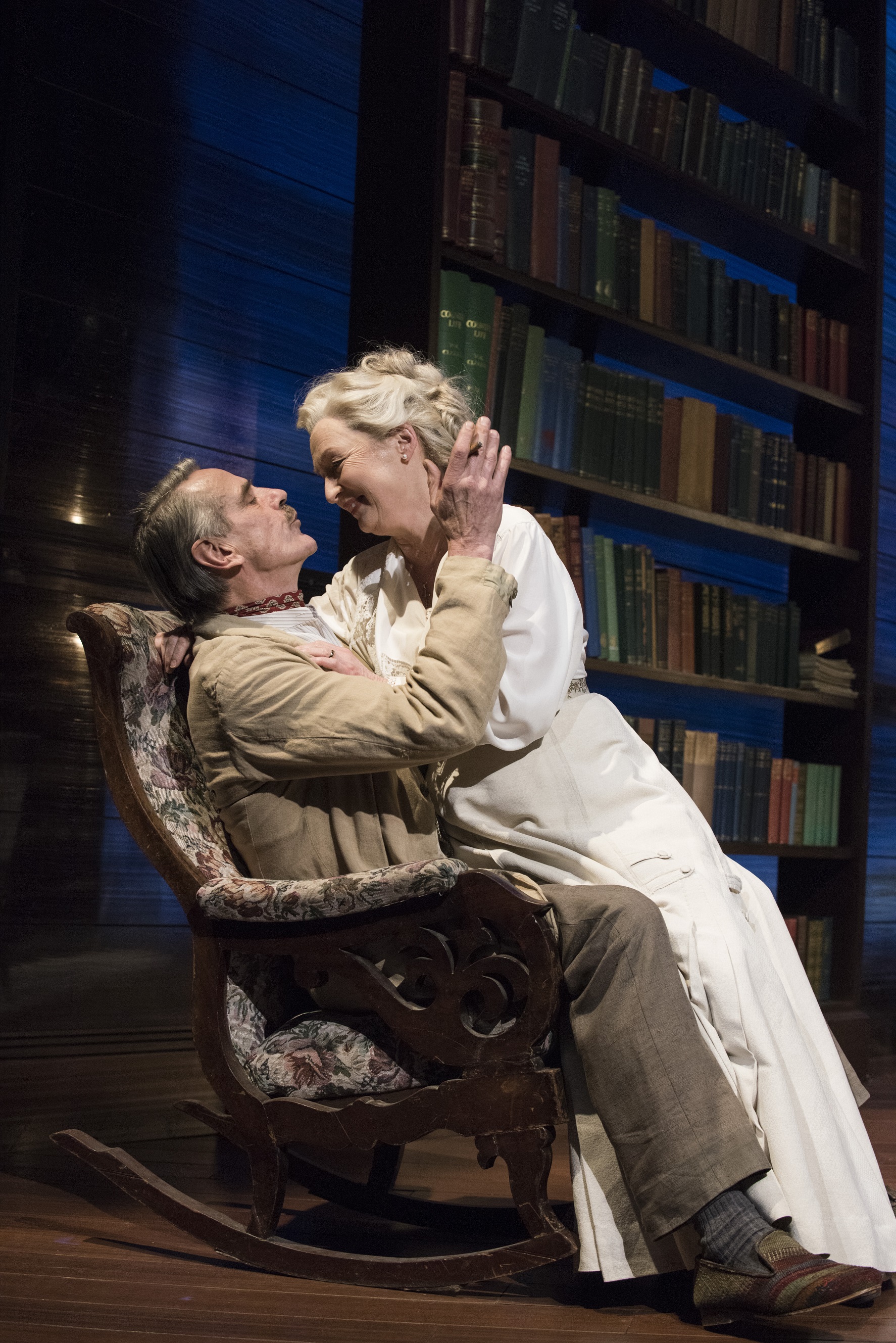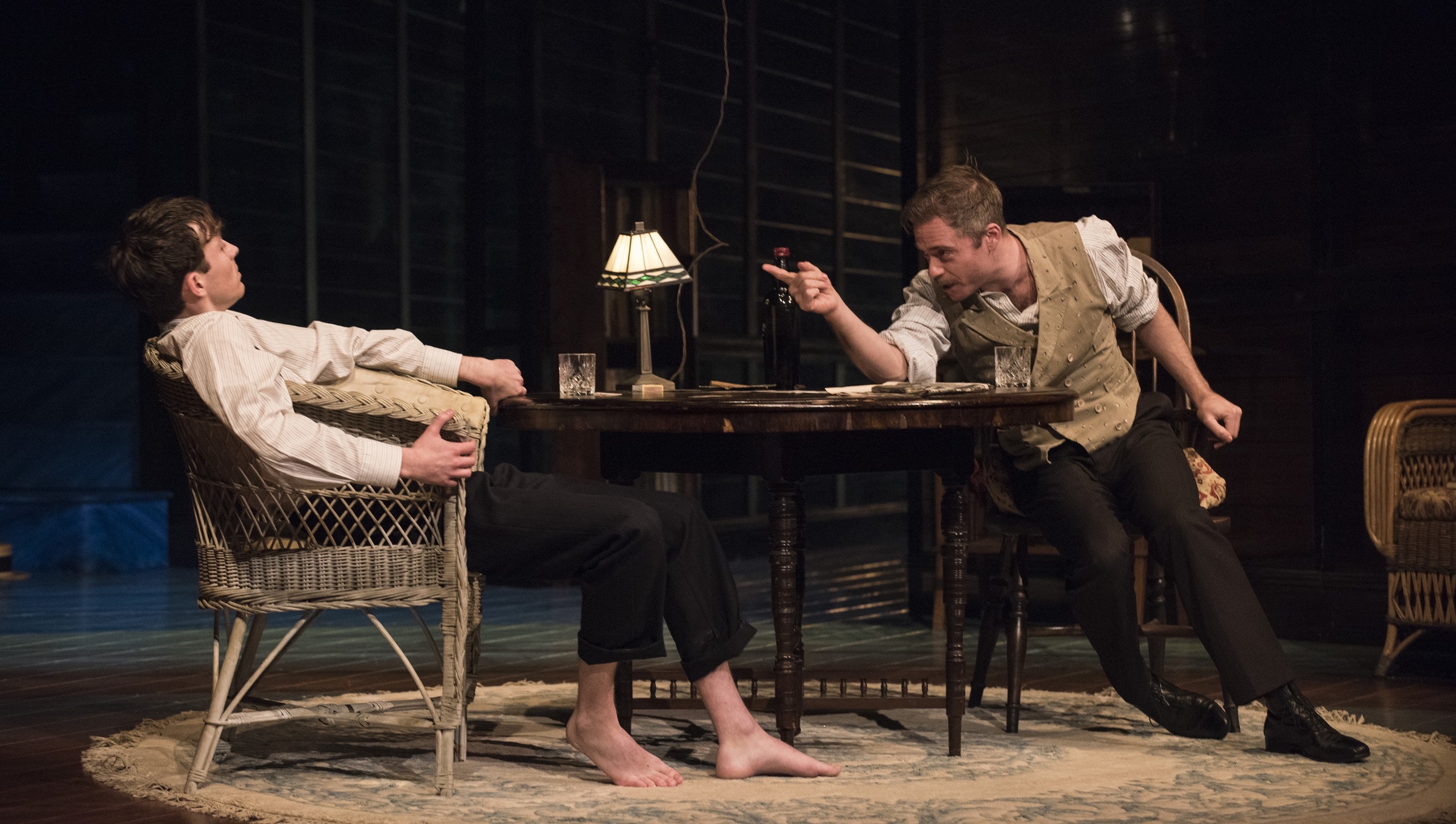Long Day's Journey Into Night, Wyndham's Theatre review - Lesley Manville hits ecstatic, fatal highs | reviews, news & interviews
Long Day's Journey Into Night, Wyndham's Theatre review - Lesley Manville hits ecstatic, fatal highs
Long Day's Journey Into Night, Wyndham's Theatre review - Lesley Manville hits ecstatic, fatal highs
A fine staging of O'Neill's family tragedy crowned by an indelible performance

Eugene O’Neill’s 1945 play Long Day’s Journey Into Night is famously a portrayal of the hellish damage that a sick person can wreak on their family, closely based on his own family.
But there is another addiction being shown, even sadder but also redemptive, and that is the addiction to loving her that her sons and husband can’t cure, despite their awful sense of the hopelessness of it having any effect on her. To that degree, the play is also a startlingly uplifting portrayal of human love, and despite its marathon length I doubt many can leave the battleground of experiencing it with only despair and impatience in their heart.
The West End’s transfer of Richard Eyre’s 2016 Bristol production comes laden with starpower (press night guests included luminaries of literature, music and ballet as well as theatre and film), and undoubtedly the name of Jeremy Irons is the dazzling draw. Sumptuous as the man is still, even at nearly 70, irresistible as his tobacco-stained voice remains, it is the extraordinary performance by Lesley Manville as his wife that is the stuff that indelible theatre memories are made of.
The role of Mary Tyrone appears impossible to master, so many facets does it have, so many nuances did O’Neill remember and remarkably translate from his mother and his imagination into the woman here. We find she was a teenager in love with her Catholic religion, dreaming of becoming a nun when she met James Tyrone, a charismatic jobbing actor playing a swashbuckling French nobleman. “I fell in love with James Tyrone, and was happy for a time,” is the play’s final line, and the last three words throb with cruelly sad honesty.
 A few years ago Laurie Metcalf gave us another astounding interpretation of Mary Tyrone as tremulous, evanescent, a lost woman. Her hold on the family was her elusiveness. Manville’s glamorous, curly, frilly Mary is by contrast bursting with life, her terrifyingly girlish ways, her febrile patting hands and high-pitched Southern-belle voice all symptomatic of a woman pent up in frustration for 35 years and now heedless of the wreckage she is causing.
A few years ago Laurie Metcalf gave us another astounding interpretation of Mary Tyrone as tremulous, evanescent, a lost woman. Her hold on the family was her elusiveness. Manville’s glamorous, curly, frilly Mary is by contrast bursting with life, her terrifyingly girlish ways, her febrile patting hands and high-pitched Southern-belle voice all symptomatic of a woman pent up in frustration for 35 years and now heedless of the wreckage she is causing.
She is desperately lonely, raging with effortless verbosity against the fog that gathers around their house, protesting at a life unlived, at a husband who “could keep on buying property but never afford to give me a home.” We hear she once dreamed of becoming a nun, and as her voice rises in joy when she harps on about it it seems that what drives her to morphine is an addiction to ecstasy, to highs, in a life of lows. “I scream in agony, and at the same time I will laugh,” Mary says, a line that Manville makes lacerating use of in her characterisation.
Irons, to his credit, conveys a genuine and powerful passion for Mary, even as she is now, his hands caressing and appreciating her (the pair pictured right), but he is rather tossed about by the wordy torrents and the horny-handed background to his character — pace his own self-deprecation in an interview on The Arts Desk recently, nature has shaped him by voice and physique for classic magnificence and resonant taciturnity, in the line of his mesmerising Henry IV in The Hollow Crown, rather than working-class insecurity and ruthlessless. It is also not altogether in Irons’ gift to play a bad actor well, and there are probably unintended comic effects. His body language is rather faux-elderly, and his accent all over the place, rarely touching down in either America or Ireland. But he emits a great and embracing kindliness, softening the edge of the reactive attacks that he tends to launch on his two sons, Rory Keenan’s terrific, cynical Jamie and Matthew Beard’s consumptive Edmund (pictured above). O’Neill sees himself in Edmund, which is rather overwritten and becomes pretentiously wordy in the long night of Act 2; Beard, physically very well a chip off Irons’ spidery block, has a fluty tenor intensity that impresses without quite moving, while Keenan, the one family member determined to sweep away pretences, roughens and undersells himself to very touching effect.
But he emits a great and embracing kindliness, softening the edge of the reactive attacks that he tends to launch on his two sons, Rory Keenan’s terrific, cynical Jamie and Matthew Beard’s consumptive Edmund (pictured above). O’Neill sees himself in Edmund, which is rather overwritten and becomes pretentiously wordy in the long night of Act 2; Beard, physically very well a chip off Irons’ spidery block, has a fluty tenor intensity that impresses without quite moving, while Keenan, the one family member determined to sweep away pretences, roughens and undersells himself to very touching effect.
The interaction of the four Tyrones is brilliantly naturalistic, their physical traits and individuality glittering with specificity against the deliberately foggy, illusory set of transparent walls by Rob Howell, lit by Peter Mumford, and with evocative, barely audible foghorns and sea wind by sound designer John Leonard. Overall a fine staging, but Manville provides the ecstatic charge in it.
- Long Day's Journey Into Night at Wyndham's Theatre till 7 April
- Read more theatre reviews on theartsdesk
Add comment
The future of Arts Journalism
You can stop theartsdesk.com closing!
We urgently need financing to survive. Our fundraising drive has thus far raised £49,000 but we need to reach £100,000 or we will be forced to close. Please contribute here: https://gofund.me/c3f6033d
And if you can forward this information to anyone who might assist, we’d be grateful.

Subscribe to theartsdesk.com
Thank you for continuing to read our work on theartsdesk.com. For unlimited access to every article in its entirety, including our archive of more than 15,000 pieces, we're asking for £5 per month or £40 per year. We feel it's a very good deal, and hope you do too.
To take a subscription now simply click here.
And if you're looking for that extra gift for a friend or family member, why not treat them to a theartsdesk.com gift subscription?
more Theatre
 Troilus and Cressida, Globe Theatre review - a 'problem play' with added problems
Raucous and carnivalesque, but also ugly and incomprehensible
Troilus and Cressida, Globe Theatre review - a 'problem play' with added problems
Raucous and carnivalesque, but also ugly and incomprehensible
 Clarkston, Trafalgar Theatre review - two lads on a road to nowhere
Netflix star, Joe Locke, is the selling point of a production that needs one
Clarkston, Trafalgar Theatre review - two lads on a road to nowhere
Netflix star, Joe Locke, is the selling point of a production that needs one
 Ghost Stories, Peacock Theatre review - spirited staging but short on scares
Impressive spectacle saves an ageing show in an unsuitable venue
Ghost Stories, Peacock Theatre review - spirited staging but short on scares
Impressive spectacle saves an ageing show in an unsuitable venue
 Hamlet, National Theatre review - turning tragedy to comedy is no joke
Hiran Abeyeskera’s childlike prince falls flat in a mixed production
Hamlet, National Theatre review - turning tragedy to comedy is no joke
Hiran Abeyeskera’s childlike prince falls flat in a mixed production
 Rohtko, Barbican review - postmodern meditation on fake and authentic art is less than the sum of its parts
Łukasz Twarkowski's production dazzles without illuminating
Rohtko, Barbican review - postmodern meditation on fake and authentic art is less than the sum of its parts
Łukasz Twarkowski's production dazzles without illuminating
 Lee, Park Theatre review - Lee Krasner looks back on her life as an artist
Informative and interesting, the play's format limits its potential
Lee, Park Theatre review - Lee Krasner looks back on her life as an artist
Informative and interesting, the play's format limits its potential
 Measure for Measure, RSC, Stratford review - 'problem play' has no problem with relevance
Shakespeare, in this adaptation, is at his most perceptive
Measure for Measure, RSC, Stratford review - 'problem play' has no problem with relevance
Shakespeare, in this adaptation, is at his most perceptive
 The Importance of Being Earnest, Noël Coward Theatre review - dazzling and delightful queer fest
West End transfer of National Theatre hit stars Stephen Fry and Olly Alexander
The Importance of Being Earnest, Noël Coward Theatre review - dazzling and delightful queer fest
West End transfer of National Theatre hit stars Stephen Fry and Olly Alexander
 Get Down Tonight, Charing Cross Theatre review - glitz and hits from the 70s
If you love the songs of KC and the Sunshine Band, Please Do Go!
Get Down Tonight, Charing Cross Theatre review - glitz and hits from the 70s
If you love the songs of KC and the Sunshine Band, Please Do Go!
 Punch, Apollo Theatre review - powerful play about the strength of redemption
James Graham's play transfixes the audience at every stage
Punch, Apollo Theatre review - powerful play about the strength of redemption
James Graham's play transfixes the audience at every stage
 The Billionaire Inside Your Head, Hampstead Theatre review - a map of a man with OCD
Will Lord's promising debut burdens a fine cast with too much dialogue
The Billionaire Inside Your Head, Hampstead Theatre review - a map of a man with OCD
Will Lord's promising debut burdens a fine cast with too much dialogue

Comments
Wonderfully written review.